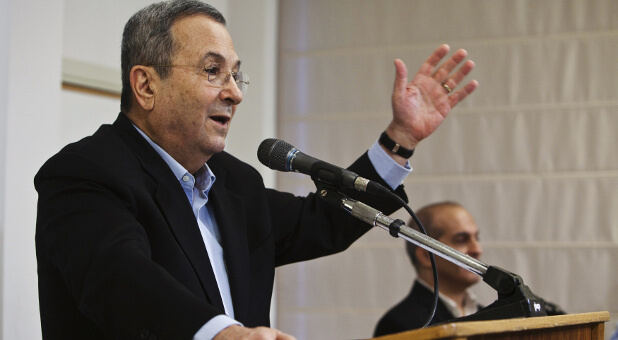Israeli Defense Minister Ehud Barak on Monday abruptly announced he was quitting politics, injecting new turmoil into the Israeli political system weeks ahead of general elections.
Barak, Israel’s most-decorated soldier and one-time prime minister, said he would stay on in his current post until a new government is formed following the Jan. 22 balloting.
His resignation could mean the departure of the most moderating influence on hawkish Prime Minister Benjamin Netanyahu, who holds a wide lead in polls and is expected to easily win re-election. Barak, who heads a small centrist faction in parliament, often served as Netanyahu’s unofficial envoy to Washington to smooth over differences with the Obama White House.
His impending departure comes at a key time for Israel, as the nation struggles to find its way in a region where the old order of Arab autocrats has been swept aside by the Arab Spring and the rise of Islamist political parties. Israel also faces a looming decision on whether to attack Iran’s nuclear program, which the Jewish state fears is designed to develop atomic weapons—a charge Tehran denies.
Less than a week ago, Barak led an eight-day military offensive against the Hamas militant group that rules the Gaza Strip. The fighting, aimed at ending rocket fire from the Palestinian territory, ended in a fragile truce.
“I didn’t make this decision (to leave politics) without hesitating, but I made it wholeheartedly,” he told a hastily arranged news conference, saying he had been wrestling with the decision for weeks.
He evaded repeated questions about whether he might agree to serve as a Cabinet minister in an upcoming government, leaving open the possibility that he might still retain an impact on Israeli politics. While most Cabinet ministers also hold parliamentary seats, they do not have to be elected lawmakers, and such appointments have been made in the past.
Barak, 70, made the surprise announcement even after polls showed his breakaway Independence Party gaining momentum after the Gaza campaign.
Despite the bump in the polls, Barak still could have found himself fighting for his political survival once election day rolls around. Surveys before the Gaza operation were unkind to his party, at times showing it polling too weakly to even send a single representative to parliament.
“I feel I have exhausted my political activity, which had never been an object of desire for me. There are many ways for me to serve the country, not just through politics,” he said, adding that his decision was spurred in part by his desire to spend more time with his family.
Possible replacements include Vice Premier Moshe Yaalon, a former military chief, and Shaul Mofaz, a former military chief and defense minister, who now serves as chairman of the opposition Kadima Party.
Barak’s political career was as turbulent as his 36-year military career was dazzling.
The former war hero and military chief of staff blazed into politics on the coattails of his mentor, Yitzhak Rabin, and had been viewed by many as his heir apparent. With a resume that includes commanding some of Israel’s most daring hostage rescue operations and raids, Barak was elected prime minister from the centrist Labor Party in 1999 — just four years after retiring from the military. Many Israelis hoped he would parlay what was seen as his sharp strategic mind and unorthodox methods on the battlefield into long-elusive accords with the Palestinians and Syria.
But the consensus-building so important in the political arena did not mesh well with the go-it-alone style that served him in the military. Political allies and foes alike considered Barak aloof and imperious, and others questioned whether he possessed the interpersonal skills necessary to negotiate elusive accords with Israel’s enemies.
Disappointed with his performance, Israeli voters booted Barak out of the premier’s office in record time — less than two years — after his government unraveled with the outbreak of a Palestinian uprising and the collapse of U.S.-sponsored peace talks.
Hard-liner Ariel Sharon trounced him in a 2001 election. Barak left behind a legacy of failed peacemaking with the Palestinians and Syria, despite unprecedented offers of sweeping territorial concessions, and a contentious decision to end Israel’s 18-year military occupation of south Lebanon overnight, which created a vacuum quickly filled by the anti-Israel Hezbollah guerrilla group.
For six years, the onetime Labor leader kept himself busy with lucrative speaking engagements and business consulting, reportedly amassing millions and cementing his image as a politician out of touch with his constituents.
But Barak returned to politics in 2007, handily recapturing the Labor leadership and replacing civilian Defense Minister Amir Peretz, who led a much-criticized war in Lebanon the previous summer.
But while Israelis liked Barak as defense minister, they didn’t want him as their prime minister, and his party, which had led Israel to independence and governed the nation for its first three decades, lost its public appeal. In the 2009 election that brought Netanyahu to power, Labor won an all-time low of 13 of parliament’s 120 seats.
Barak’s dovish base turned on him after he led Labor into Netanyahu’s conservative government, accusing Barak of betraying the party’s ideals by joining forces with a man who at the time did not even recognize the principle of a Palestinian state.
In January 2011, he bolted Labor to form a new party, Independence, which has largely failed to resonate with the public.
Israeli hard-liners disliked him, too, accusing him of undermining the West Bank settlement movement by holding up building approvals, clearing squatters from West Bank homes and encouraging Netanyahu to support a temporary settlement construction slowdown.
But if Barak was unpopular with the public, he retained his clout with Netanyahu, whom he commanded in an elite special operations unit. As the prime minister’s point man with the United States, Barak was welcomed in Washington as a moderating influence on Netanyahu’s hard line policies toward the Arab world and Iran’s nuclear program.
That alliance saw some rocky times recently with reports the prime minister objected to Barak’s newly moderate tone that Israel should defer to the U.S. in deciding whether to attack Iranian nuclear facilities.
But the two seemed to have patched up things, appearing to work harmoniously on the recent Gaza campaign.
In a statement Monday, Netanyahu said he “respected” Barak’s decision.
Copyright 2012 The Associated Press











































